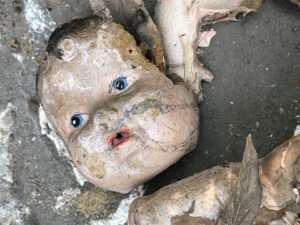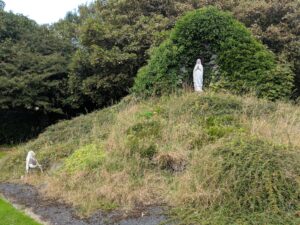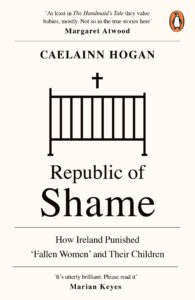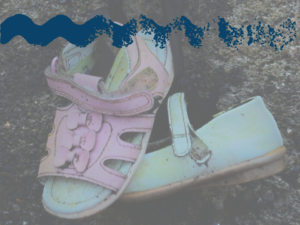
When Caelainn Hogan’s non-fiction book about Irish institutions was released (Republic of Shame, 2019), it was compared to The Handmaid’s Tale, a fiction. Margaret Atwood herself stated “at least in The Handmaid’s Tale they value babies, mostly. Not so in the true stories here”.
We were introduced to Caelainn last year. The amount of work she’d done with survivors and their experiences was meaningful, given reports on how official reports and commissions had omitted such testimony. The way audiences engaged with her detailed understanding -teamed with an empathetic but pragmatic pursuit of survivor dignity- made her a strong presenter on the subject.
We used this connection to invite Caelainn to reflect on what the 10-year anniversary of The McAleese Report means in practice. Below, Caelainn reflects on some of her encounters, the process and the work yet to be done.
Trigger warning
Though this article does not feature any individually graphic testimony or expletive language, it is about harm and hardship in Ireland’s institutional facilities. It also details some of the responses. This could be upsetting for some readers. Please proceed with care.
Article contents
- What does justice look like a decade on?
- What were the Magdelene Laundries?
- Power and misdirection
- Rights to information from the publicly funded
- Seeking justice
- Continuing issues of state-led institutionalisation
- Support Services
What does justice look like a decade on?
Ten-years ago, Ireland apologised for the Magdalene Laundries. These were a system of institutions that incarcerated thousands of women and girls. They stripped them of their names, forcing them to work unpaid; often washing clean the dirt of government departments. After all these years, what justice is there for survivors?
Rose
A few years ago, during lockdown, I stood in a survivor’s front garden in Dublin. My laptop was balanced on a wall so she could safely watch the state apologise, yet again.. This time apologies were given to survivors of the mother and baby institutions, where many women sent to Magdalene Laundries were forcibly separated from their children.
Survivors weren’t even given a copy of the investigation’s final report to read before the announcement. Their access wasn’t considered. “I just want justice,” Rose said, shaking her head at those in power, their words ringing hollow.
Rose was sent twice to the Tuam Mother and Baby Institution, where hundreds of children died and the remains of many still lie in sewage chambers. After being separated from her second child, Rose became a woman the church and state considered a “multiple offender”. She was sent to the Galway Magdalene Laundry.
What were the Magdelene Laundries?
 The Magdalene Laundries operated in Ireland from the 1700s. The first Magdalene institution was opened in London years before the first Irish asylum. Nevertheless, Westminster has resisted calls for investigations into forced adoption and has never fully investigated the Magdalene Laundries across Britain. Magdalene institutions were set up in a number of countries that were colonised by Britain and by France, where Catholic nuns who set up institutions in Ireland were trained and sent from.
The Magdalene Laundries operated in Ireland from the 1700s. The first Magdalene institution was opened in London years before the first Irish asylum. Nevertheless, Westminster has resisted calls for investigations into forced adoption and has never fully investigated the Magdalene Laundries across Britain. Magdalene institutions were set up in a number of countries that were colonised by Britain and by France, where Catholic nuns who set up institutions in Ireland were trained and sent from.
Under the nascent Irish state, religious orders received public funding and contracts for the incarceration and unpaid labour of women and girls. The Laundries operated until the 1990s in Ireland.
The final report of the inquiry* into the Magdalene Laundries, led by Senator Martin McAleese, was published in 2013. It found that at least 10,000 women and girls were put into these institutions, between the state’s founding and 1996 when the last closed. The closure of the last followed the discovery, 3-years earlier, of 155 bodies at a former Laundry run by Our Lady of Charity, leading to a public outcry for an official intervention and explanation.
The state was responsible for sending a quarter of those incarcerated to these institutions. Laundries were part of a wider system of industrial schools, and mother and baby institutions, where survivors describe endemic abuse and dehumanisation.
Power and misdirection
 For my book, Republic of Shame, I spoke with many survivors of the Laundries and documented how authorities treated them. An internal government memo, regarding admission of two teens to a Good Shepherd Laundry in Limerick, described them as ‘mental defectives’. One was a 17-year-old who had given birth; the other only 14-years-old.
For my book, Republic of Shame, I spoke with many survivors of the Laundries and documented how authorities treated them. An internal government memo, regarding admission of two teens to a Good Shepherd Laundry in Limerick, described them as ‘mental defectives’. One was a 17-year-old who had given birth; the other only 14-years-old.
A letter sent in the 1950s from a county council to the Department of Health described a patient, sent to High Park Laundry, as:
‘an unmarried lady who has given birth to two or more children and whose moral rehabilitation would prevent her becoming a health and social problem’.
These mothers were incarcerated in Laundries to prevent them becoming a “burden” on the taxpayer. Other “penitents” were simply born in an institution, were victims of sexual abuse or assault, had a disability or were just considered difficult or unruly.
What redress could look like
After The McAleese Report, the state set up a redress scheme, based on a review by former High Court Judge John Quirke. The review spoke to more than 300 Magdalene survivors and upheld their claims of forced and unpaid labour. The four religious orders that ran these institutions were asked repeatedly to contribute to redress, but refused. Some argued that the records they offered survivors, searching for information, acted as a form of redress.
When Rose applied for her records from the Sisters of Mercy, who ran the Galway Laundry, they sent back only a single line from a ledger. It stated that nuns from Tuam sent her to the Magdalene Laundry, and under cause: “Penitent – twice”. Her two children were treated as offences. Access to this information wasn’t easy. Despite today’s Government speaking about “survivor-led solutions” -and after huge resources spent on official investigations- survivors still have to struggle for full access to their information.
Continued injustices
The state spent tens of millions on the Magdalene redress scheme, much paid to lawyers rather than survivors. In 2013, the government expected the scheme to cost €58-million. The four religious orders issued statements expressing regret for any hurt experienced in their institutions, with caveats about the nuns providing a refuge in good faith. They still refused to pay redress, while continuing to receive public money, despite their combined gross assets being valued at €1.5-billion.
When The McAleese Report was published, there were 58 Magdalene survivors still living in the “care” of the same nuns that ran the Laundries and on the same grounds in which they were incarcerated. Judge Quirke noted that the nuns were worried that redress paid to these women might jeopardise their own state funding.
I spoke to one woman -born in Ireland’s largest mother and baby institution- then forced to work in a Magdalene Laundry most of her life. She was still living behind the walls of a facility, run by the same nuns that failed inspections by health authorities.
Rights to information from the publicly funded
In Republic of Shame, I write about an exchange between researchers for the McAleese inquiry and the Sisters of Our Lady of Charity. The latter received public money to run a nursing home on the grounds of their former High Park Laundry. A researcher phoned the nuns to ask about these Magdalene survivors, to be told no information would be provided. He emailed, noting the refusal, pointing out the nuns were receiving public funding. This sparked an official panic within the health service, with the researcher accused of ‘stirring up a very sensitive situation’. McAleese himself wrote to the nuns, apologising for ‘confusion and distress’ caused, emphasising the nuns’ ‘invaluable assistance’. Simultaneously, it signaled the weakness of the inquiry to compel information.
Such religious orders still maintain control over survivors’ records and arbitrate information when it comes to survivors applying for redress.
30-years ago, when the exhumation on the grounds of High Park Magdalene Laundry found the remains of 155 people. It was a mass grave of women incarcerated there, with as many as eighty unidentified. The remains were hurriedly cremated and reburied in a communal plot in Glasnevin cemetery. Many women who died in the Laundries, buried in mass graves, would have remained unidentified if not for the work of Justice for Magdalenes Research (jfmresearch.com/). There are still families seeking to remove their loved ones’ remains to bury them with other loved ones.
Seeking justice
After the McAleese inquiry, Justice for Magdalenes Research issued a counter-report to The McAleese Report. The group was ‘deeply troubled’ that 793-pages of transcribed survivor testimony, which the group provided, was seemingly ignored. They said The McAleese Report marginalised ‘the women’s lived experiences in these institutions, minimising the physical and psychological abuse suffered, while evading human rights violations’.
The 2021 Commission of Investigation into Mother and Baby Homes Final Report has also been criticised for disregarding survivor testimony as evidence. The report put blame on families and fathers rather than Church and State.
Rose
Rose told me the father of her daughter came to visit her in Tuam, but the nuns wouldn’t allow him see his child. There were men denied the right to raise their children, even when they fought for it in the courts. Many families never knew their daughters were sent away to institutions by doctors, priests, religious crisis pregnancy agencies and social workers.
Elizabeth
A decade after the McAleese inquiry, survivors of the Laundries are still seeking justice and still being denied. Just this year, the UN Committee Against Torture ruled against Elizabeth Coppin. Elizabeth has claimed the Irish state failed to investigate allegations of the torture and ill treatment she suffered, while incarcerated, in three different Laundries.
Continuing issues of state-led institutionalisation
Survivors gave testimony, reliving trauma so that the same injustices would never be repeated. But what systems of institutionalisation are we normalising today? The first “family hub” -an institutional emergency accommodation for homeless families- was opened on the grounds of the High Park Laundry.
Ireland still warehouses people seeking international protection. While the state has promised to move away from “congregated” settings for older people or people with additional needs, many still remain -effectively- institutionalised. Religious orders that incarcerated women and girls involved in prostitution in Laundries set up an organisation that receives public funding for anti-prostitution initiatives. These often uphold the criminalisation of sex work, which many sex workers themselves say is harmful.
Tiled crosses and huge fans are still visible on the walls of the Magdalene Laundry on Sean McDermott Street, the last to close in the country. Long vacant, this former institution will soon be turned into a ‘site of conscience’, but more still needs to be done for survivors, especially those who are still vulnerable and marginalised. (See note about the National Centre for Research and Remembrance below).
Morality in question
 A survivor I know was sent to a Magdalene Laundry as a child. She’d been being physically and sexually abused in an industrial school. She later gave birth in a mother and baby home institution. She is homeless today. What justice has the state or the church offered her?
A survivor I know was sent to a Magdalene Laundry as a child. She’d been being physically and sexually abused in an industrial school. She later gave birth in a mother and baby home institution. She is homeless today. What justice has the state or the church offered her?
Caelainn Hogan, 2023.
Readers can find out more about Caelainn and her book here, at Penguin Books.
Support Services
If you have been affected by any of the content of this article, please consider consulting one of the following services.
Connect Counselling
An anonymous professional telephone counselling service for survivors of physical, emotional and sexual abuse. Freephone in the UK and Northern Ireland +44 (0) 800 477 477 77. connectcounselling.ie
ICAP
ICAP is the only specialist British-based counselling and psychotherapy service supporting people from the Irish community facing a range of emotional issues, including depression, anxiety and stress. Helpline: +44 (0) 207 272 7906. icap.org.uk
Irish Community Care and/or Fréa
Assisting with gaining access to the Irish Government’s payment scheme for mothers and children who were resident in specific institutions, they also offer some advice in accessing records and other aspects of the redress scheme. There is more information here: frea.org.uk/motherandbabyhomes
Justice for Magdalenes Research
A resource for people affected by and interested in Ireland’s Magdelene Institutions, is accessible here: jfmreasearch. com
Mother and Baby Homes Commission of Investigation
To access the Irish Government’s report and additional information, visit: gov.ie/en/collection/mbhcoi
My Data Rights
A resource for people affected by the ‘historical’ human rights violations in Ireland provides information for survivors of the Irish industrial and reformatory schools about using GDPR protocols to gain access to personal information. The website contains downloadable guides and template letters for requesting personal data and for complaining to the Data Protection Commission if necessary. This is a project of the Human Rights Law Clinic at the Irish Centre for Human Rights, NUI Galway. mydatarights.ie
Samaritans, The
The Samaritans offer a non-judgmental listening service, whatever you are going through. Call free, 24/7 in the UK, on 116 123. samaritans.org
Sexual Violence Support (North West)
A service to help locate the relevant support services for those who have suffered sexual violence across the North West. sexualviolencesupport.co.uk
Survivors Trust, The
The Survivors Trust has 120 member organisations based in the UK and Ireland which provide specialist support for women, men & children who have survived rape, sexual violence or childhood sexual abuse. thesurvivorstrust.org
Tuam Home Survivors Network
Survivors helping survivors. tuamhomesurvivors.com
NB: This information was tested and accessible on 24 Mar 2024. It is not an exhaustive list of services available.
On 4 Sept 2023, Liverpool Irish Festival received a notification from the Embassy of Ireland about a consultation concerning the National Centre for Research and Remembrance. Consultation opened earlier in the year and will last until 15 Sept 2023. More information on the Centre, the steering committee and consultation can be found here.
You are not alone. Make contact. You will be heard.


